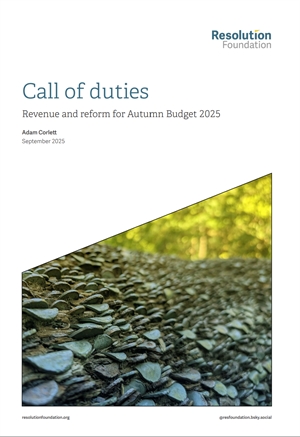Continuing the fuel duty freeze set to cost Treasury nearly £4bn a year to 2030
Tue 23 September 2025
View all news

A continued freeze on fuel duty in the Chancellor's upcoming budget would cut tax receipts, on average, by £3.8bn a year according to the Office for Budget Responsibility. Fuel duty has remained frozen for 15 consecutive years and is now a third lower in real terms than it was in 2010. There are growing calls for the duty to be increased, particularly against the backdrop of a very challenging fiscal situation.
Replying to a Parliamentary question from Dr Scott Arthur MP, Exchequer Secretary to the Treasury Dan Tomlinson MP said that at the Autumn Budget 2024 fuel duty was frozen at the rate of 52.95 pence per litre for 2025/26, at a projected cost of £3,015m in 2025/26. Fuel duty was also frozen at Spring Budget 2024 for 2024/25 by the previous Government at a projected cost of £3,090m in 2024/25.
A new report from the Resolution Foundation calls for the fuel duty freeze to end, suggesting "a more credible new uprating regime" to facilitate that; VED should be reformed for future sales, including a weight and mileage link for electric vehicles.
The report says that the cumulative cost to the exchequer of the freezes and cuts to fuel duty since 2010 is put at £130bn – "a colossal sum given the struggle governments have had to balance the books during that time".
As long ago as 1993, then Chancellor Norman Lamont (in John Major's Government) introduced a 'fuel duty escalator' designed both to raise revenue and meet environmental concerns by encouraging people to travel less and to use more energy efficient vehicles.
Considering that, unlike 1993, the Government is now bound by the legal commitment to meet net zero in 2050 (and that transport is one of the most challenging to decarbonise) it is surprising that the Government does not appear to see fuel duty also as a lever to help in meeting climate change targets.
Since 2010, however, successive governments have been reluctant to arouse the hostility of pro-motoring groups, particularly as some road conditions have deteriorated. Recent reports suggest that the current Chancellor, Rachel Reeves, plans to maintain the fuel duty freeze in the upcoming budget. (See associated Independent news link.)
Though fuel duty freezes have been presented as offering a benefit to "hard-pressed motorists" a 2023 study by the Social Market Foundation found that the richest fifth of households have benefited twice as much from the freeze as the poorest fifth.
Related Links
< Back to news list